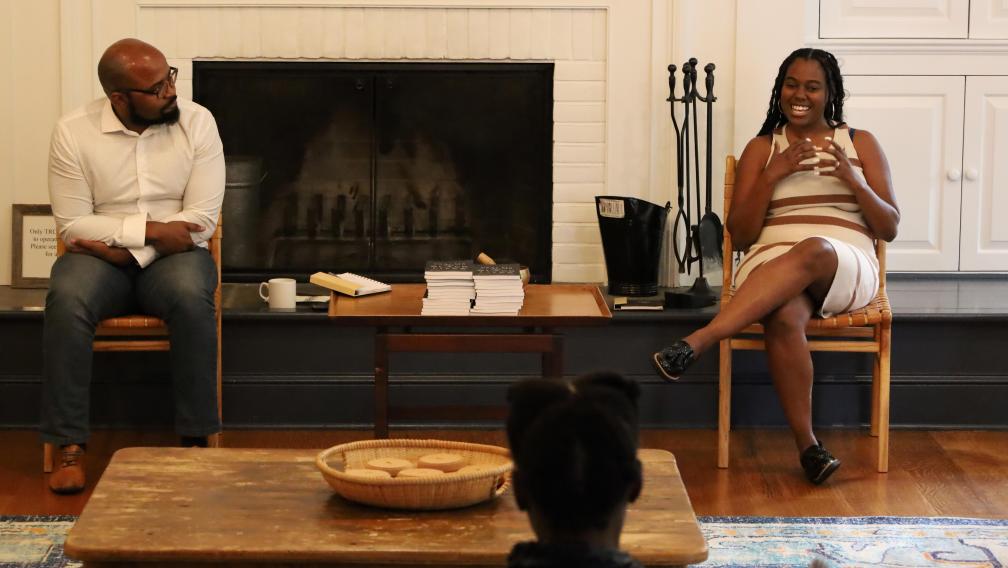Black Lives and the Psalms at Trinity Retreat Center

When the Rev. Gabby Cudjoe-Wilkes and her husband, the Rev. Andrew Wilkes, co-pastors at The Double Love Experience Church in Brooklyn, helped their predominantly Black congregation weather Covid, the murder of George Floyd, and street demonstrations during the summer of 2020, they found a source of power in poems and songs written 3,000 years ago.
Now the two pastors have written a book, Psalms for Black Lives: Reflections for the Work of Liberation, about that pandemic experience and how the Bible's Book of Psalms provided comfort, motivation, and inspiration for resistance. Recently, they used their book to facilitate the retreat “Wade in the Water: Celebrating Blackness” at the Trinity Retreat Center.
Trinity Church Wall Street staff member Jim Melchiorre spoke with the Rev. Gabby Cudjoe-Wilkes about the book and the retreat.
JM: At a time of pandemic and a historic reckoning over race in the United States, some people might be surprised to learn that what you found relevant dates back 3,000 years.
GCW: In times of crisis, people flock to what is familiar. Everyone was learning as we went so, for us being pastors, naturally, we turned to scripture. The psalms get really honest about their frustration, about why are the wicked prospering. The psalmist is able to navigate the depths of frustration, so that when they do land at some degree of hope, it doesn't feel like false hope. We didn't want to just give people these platitudes that didn't match the severity of the moment.
JM: Two sessions at the retreat were called “Celebration” and “Lament,” which sound like two sides of the same coin.
GCW: I believe that lament, true lament, is a faith claim. If you have the capacity to lament, then you still have the capacity to believe that there's still time for [things] to change. I think about the Civil Rights movement and Dr. King. The way that he approached the world was I'm gonna lament out loud that I still don't have what I should have as a citizen of this nation. And he had enough faith to assume that if I lament long enough and strategically enough, and to the right people, that things can still change.
Celebration is really meant to help people look for that silver lining on a really cloudy day, and to give people permission to experience some joy in the midst of deep sorrow. In those moments of celebration, we strengthen ourselves to go back into the fight. I love how Andrew talks about it, that celebration is like a vaccine. The vaccine may not prevent you facing sorrow, but it will allow you to experience it differently.
JM: An important part of your book and the way you facilitate retreats is this concept called Justice Imagination.
GCW: We suggest that you have to cultivate your spirit to imagine justice because the conditions of inequality are so dominant and dire that they can sap that imagination from us very early in life, and so we can't even imagine a world where justice takes place. The project of the entire book is to condition our souls devotionally to recognize that there are some unjust systems and structures that have dominated society as normative that we must find the courage to continue pushing back against.
We cannot do away with race yet because we have not done away with the ramifications that race has impacted, that race has brought upon Black and brown people, right? We can't just turn a page and say it's a clean slate.
The Rev. Gabby Cudjoe-Wilkes
JM: Are you planning to offer more retreats using the book as facilitation?
GW: The retreat that we did at Trinity was the first of its kind. The only other immersive approach we've taken with this book is a one-day Justice Imagination Lab that we hosted in Houston. I believe the slow work of retreats and slowing up the dialogue and sitting with people the way we were able to do at West Cornwall, and the way we were able to do in the lab in Houston, I think that's where a lot of the change happens.
JM: While the Book of Psalms in the Bible and your book are available to anybody, you and Andrew center Black lives. How does that play out?
GCW: We're running into some interesting conversations, like “is race a social construct that we've all bought into that doesn't serve us?” My response to those kinds of conversations is we cannot do away with race yet because we have not done away with the ramifications that race has impacted, that race has brought upon Black and brown people, right? We can't just turn a page and say it's a clean slate. Particularly with Black Americans; [we] were brought here against [our] will. That history has an impact on our faith and how we go to God as we do this really hard devotional work and still, in spite of all of that, try to create this justice imagination in ourselves.
“Pastors Gabby and Andrew have written a book quite topical for the times we live in,” said the Rev. Dr. Mark Bozzuti-Jones, Priest and Director for Spiritual Formation at the Trinity Retreat Center. “Their energy, theology, and spirituality gave us all we needed to celebrate the spirituality and joy in the African American community.”





